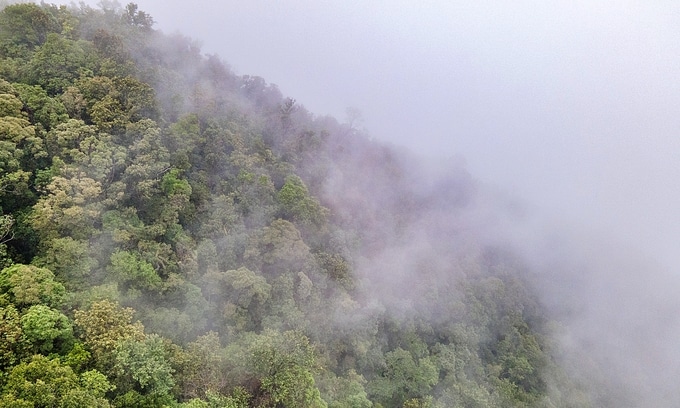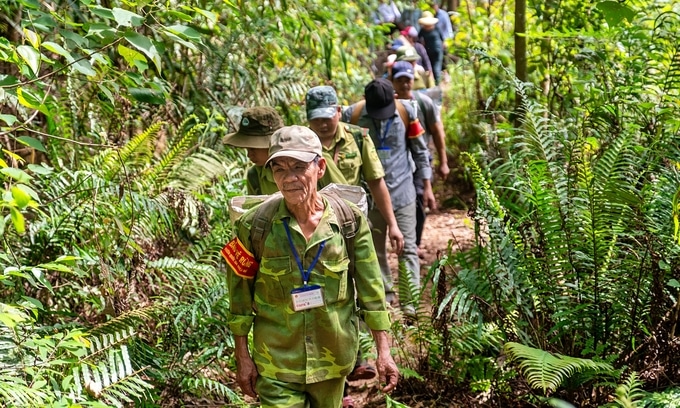
Tham is not the only individual. He and numerous other residents of Khe Su Hamlet, Loc Tri Commune, Phu Loc District (Thua Thien – Hue) conduct routine forest patrols with forest rangers. The forest protection team removes traps set by illegal loggers or cleans up plastic refuse left behind by tourists during each patrol.
He is reminded of the reason he continues to safeguard this critical ecosystem during calm moments such as today, when everyone rests while harvesting bamboo shoots along the road. This is a demanding and unrelenting occupation.
Tham stated, “We are not just doing this work for ourselves. Everyone benefits from the presence of lush, healthy forests. Forests protect against floods, purify the air, and mitigate the effects of climate change. We all must collaborate”.
However, safeguarding the forest is a challenging endeavor. “In the past, the forest ranger force was small and the area they supervised was vast, which meant that they were unable to cover everything. The forest’s protection has been significantly enhanced by the increased manpower that has been achieved as a result of the local community’s involvement”, ranger Vo Hong Minh stated.
Additional resources for forest protectors
The Forest Carbon Partnership Facility (FCPF) of the World Bank (WB) is providing financial support for the forest protection initiatives of Tham, ranger Minh, and individuals from over 1,300 communities in the program area.
The FCPF acknowledges the significance of forests in the battle against climate change. Reforestation, forest restoration, and improved preservation and management of existing forests will contribute to the reduction of CO2 emissions. The primary causes of global climate change are CO2 and other greenhouse gases.
An Emission Reductions Payment Agreement (ERPA) was signed between the Government of Vietnam and the FCPF in October 2020, which encompassed 2.9 million hectares of natural forests in six provinces of the North Central region.
The FCPF will provide Vietnam with USD 51.5 million to support forest protection initiatives, to reduce 10.3 million tons of CO2 over six years, commencing in 2018. Individuals and communities that safeguard forests receive a portion of this budget.
It is important to note that Vietnam surpassed this objective during the initial reporting period, which spanned from 2018 to 2019. Vietnam reduced 16.2 million tons of CO2 during this period, as indicated by the carbon emission reduction measurement report. Aster Global Environmental Solutions independently verified this figure.
Tran Quang Bao, Director General of the Forestry Department (Ministry of Agriculture and Rural Development), declared that this agreement is a significant milestone for Vietnam’s forestry sector. It will facilitate the allocation of additional financial resources to support forest protection and the livelihoods of residents, in addition to reducing greenhouse gas emissions.

Successful forest management through sustainable practices
Vietnam’s earlier, decisive efforts to safeguard its forests are the reason for its success in implementing the Emission Reductions Payment Agreement (ERPA) in six provinces of the North Central region. Vietnam has carefully enforced the protection of natural forests since 2017, which includes a prohibition on the exploitation of natural forest timber.
Furthermore, Vietnam has implemented a variety of policies to assist communities that are inextricably linked to forests, thereby enabling them to diversify their livelihoods and decrease their dependence on forest resources. For instance, forest-keeping communities are provided with financial assistance to safeguard forests and are encouraged to engage in livelihood transformation initiatives. Vietnam has been a global leader in the implementation of the Payment for Forest Environmental Services (PFES) policy for forest guardians since 2008. Thus far, the policy has generated nearly USD 400 million in revenue.
Nguyen Thi Le Thu, a senior environmental specialist at the World Bank (WB), observed that the Emission Reductions Payment Agreement is a significant milestone for Vietnam. It highlights the potential for generating new revenue from the carbon absorption and storage of forests, while also increasing the budget for forest protection and development.
Future-oriented and equitable distribution
In March 2024, the Vietnamese government received the complete payment for the contracted emission reduction of 10.3 million tons of CO2 under the ERPA. This payment is the FCPF’s most substantial ever for verified emission reductions on a global scale.
In 2022, the Vietnamese government issued an implementation decree to guarantee the equitable distribution of these financial benefits. The community of Tham received 50 million VND. These payments are benefiting approximately 70,000 forest protection participants in more than 1,300 communities across six provinces.
The communities have a say in the allocation of funds. Thám’s village elected to implement solar power in an area that is presently unconnected to the national grid and is inhabited by ethnic minorities. “This investment will improve the safety of that area,” stated Thám, emphasizing the community’s commitment to enhancing the lives of its most vulnerable members.
Digital technology is facilitating the delivery of funds to remote regions. Ethnic minority community members can manage and monitor payments from the program using a mobile app, which is supported by the EnABLE Trust Fund, which enhances access to benefits from emission reductions.

An environmentally friendly future
During the 2018-2019 period, Vietnam exceeded its target by 5.9 million tons, resulting in a reduction of 16.2 million tons of CO2 due to the forestry sector’s efforts. Vietnam is anticipated to surmount its CO2 reduction objectives for the remaining reporting periods (2020-2024) in light of this trend.
Vietnam could contemplate the possibility of generating additional revenue through direct transfer agreements or trading on the carbon market with this surplus. The World Bank is actively assisting Vietnam in maximizing the benefits of forest preservation efforts, ensuring that the country meets its national greenhouse gas reduction targets while balancing the interests of all stakeholders.
The WB is committed to continuing to provide support to Vietnam in the expansion of the ERPA program, thereby enabling the country to realize the maximum potential of reducing up to 40 million tons of CO2 in the six North Central provinces.
Forest conservation is a lifelong commitment for individuals such as Tham, despite the obstacles they encounter. We could achieve even greater success with additional resources. The government will devise strategies to sustain and potentially broaden this initiative”, Tham expressed his optimism.




